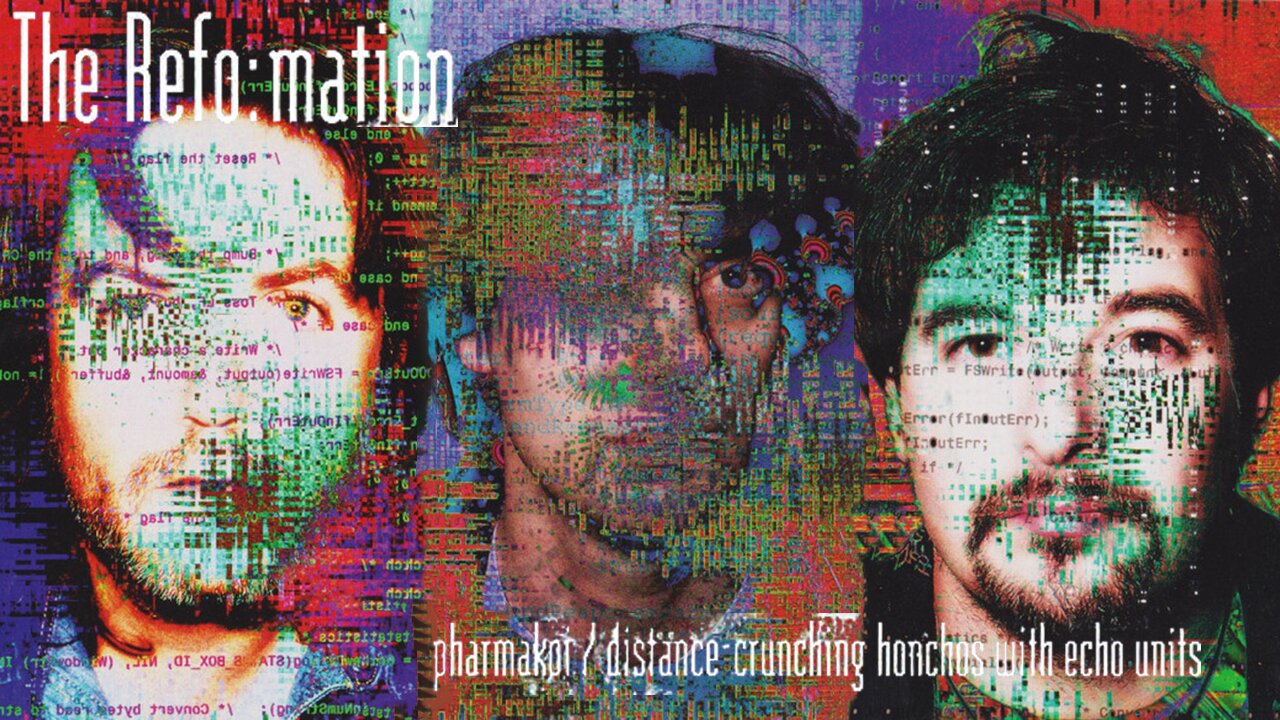Premium Only Content

The Refo:mation - Pharmakoi/Distance Crunching Honchos With Echo Units (Full Album)
The Refo:mation - Pharmakoi/Distance Crunching Honchos With Echo Units (Full Album)
00:00:00 1:07
00:01:07 Don't Move
00:05:30 Traitor
00:10:52:01 She Comes In Singing
00:14:36:25 All See It Now
00:19:19:14 Trying to Get In
00:24:57:27 Florian Trout
00:29:33:04 528
00:33:02 Who is the One?
00:38:36 Get Over It
00:42:21 Take Your Place
00:46:07:19 Towards Sleep
00:51:30:15 The Moon and the Sea
00:56:46:20 Stop
Ladies and gentlemen, as the sun descends and the labors of the day recede, this musical composition, crafted by The Refo:mation in their 1997 opus *Pharmakoi/Distance Crunching Honchos With Echo Units*, emerges as a sonic sanctuary for the weary soul. In an age where the clamor of modernity—its relentless digital cacophony and shallow cultural pretensions—threatens to drown the spirit, this work beckons you to recline, to shutter your eyes, and to surrender the restless machinations of the mind. Like a trireme gliding silently across the wine-dark sea, it invites you to drift downstream, borne aloft by the currents of Kilbey’s ethereal vocals, Koppes’ disciplined yet soaring guitar, and Powles’ rhythmic pulse, steady as a Spartan phalanx. This is no mere melody, but a deliberate act of reclamation—an antidote to the frenetic trivialities of a world unmoored, offering instead a fleeting restoration of order, contemplation, and the timeless solace of art wrought with purpose.
In the waning years of the twentieth century, as the cultural West grappled with its own decadence and the looming specter of technological overreach, three Australian musicians, all members of The Church—Steve Kilbey, Peter Koppes, and Tim Powles—convened under the banner of The Refo:mation to forge an artifact of enduring sonic defiance: Pharmakoi/Distance Crunching Honchos With Echo Units (1997). This was no mere album, but a bold reclamation of the primal spirit of rock, a counterstroke against the homogenized pop pablum and derivative Britpop of the era, exemplified by the likes of Oasis. Where others succumbed to the siren song of commercial banality, The Refo:mation, born from the ashes of The Church’s internal strife, crafted a work that was at once a lament for lost coherence and a defiant assertion of artistic sovereignty.
The album’s title itself—a cryptic amalgam of Greek scapegoat mythology (pharmakoi) and a nod to the mechanistic bravado of “distance-crunching honchos with echo units”—evokes a world where ancient ritual collides with the cold precision of modernity. This is no accident. Kilbey, Koppes, and Powles, like latter-day Aeschylean poets, weave a tapestry of sound that is both richly atmospheric and relentlessly introspective. Tracks like “All See It Now” and “Stop” pulse with a raw, almost Homeric vigor, their guitar-driven intensity tempered by Kilbey’s haunting vocals, which carry the weight of a prophet decrying a civilization adrift. Koppes’ fretwork, shimmering and expansive, recalls the disciplined artistry of a hoplite phalanx, each note a calculated strike against the entropy of the age. Powles, the rhythmic anchor, wields his drums with the precision of a siege engineer, his production techniques foreshadowing the future of The Church’s sonic evolution.
Yet, for all its muscularity, Pharmakoi is no mere exercise in bravado. It is a study in paradox: moody yet uplifting, stark yet lush, cohesive yet born of a fractured collective. The absence of The Church’s Marty Willson-Piper looms large, a silent reminder of the tensions that birthed this project. But rather than collapse under the weight of discord, The Refo:mation channels it into a work of disciplined creativity. Songs like “Don’t Move” and “Traitor” push the boundaries of rock, blending psychedelic textures with a post-apocalyptic edge, as if the band were scoring the soundtrack to a world teetering on the brink of renewal or ruin. The album’s promotional tagline—“refo:mation automation meditation space station hesitation elevation excitation relaxation information”—reads like a manifesto for a new cultural order, a rejection of the shallow certainties of the 1990s in favor of something deeper, stranger, and more enduring.
In the manner of Thucydides chronicling the Peloponnesian War, Pharmakoi/Distance Crunching Honchos With Echo Units stands as a testament to the resilience of the human spirit amid division and decline. It is not a Church record, but a reformation in the truest sense—a breaking of old forms to forge something new, vital, and unyielding. For those who would listen, it offers a clarion call: to reject the ephemeral, to embrace the eternal, and to find meaning in the echoes of a world that refuses to be silenced.
-
 18:09
18:09
Forrest Galante
5 days agoI Survived 24 Hours In The World's Deadliest Jungle
187K30 -
 LIVE
LIVE
Lofi Girl
2 years agoSynthwave Radio 🌌 - beats to chill/game to
290 watching -
 2:15:09
2:15:09
Badlands Media
17 hours agoOnlyLands Ep. 27: Power Hour Hangover, Trump’s Wartime Shift, and Portland in Flames
113K26 -
 22:21
22:21
DeVory Darkins
7 hours ago $17.63 earnedRioters attack Portland ICE Facility as Democrats make shocking admission
22.8K87 -
 2:06:06
2:06:06
TimcastIRL
9 hours agoTrump DOJ Announces INTERVENTION In Portland Over Nick Sortor Arrest | Timcast IRL
238K386 -
 6:53:58
6:53:58
SpartakusLIVE
11 hours ago#1 All-American HERO with LUSCIOUS hair and AVERAGE forehead brings Friday Night HYPE
68.9K7 -
 3:06:43
3:06:43
Laura Loomer
9 hours agoEP147: Islamic Terror EXPLODES In The West After UK Synagogue Attack
51.3K43 -
 1:02:50
1:02:50
Flyover Conservatives
14 hours agoEric Trump: America’s Most Subpoenaed Man SPEAKS OUT! | FOC Show
45.8K13 -
 3:36:44
3:36:44
PandaSub2000
1 day agoSuper Mario Galaxy 1 & 2 | ULTRA BEST AT GAMES (Original Live Version)
35K3 -
 1:26:04
1:26:04
Glenn Greenwald
13 hours agoJournalist Ken Klippenstein on Trump's New Domestic Terrorism Memo; Glenn Takes Your Questions on Bari Weiss's CBS Role, His Interview with Nick Fuentes, and More | SYSTEM UPDATE #526
101K84
